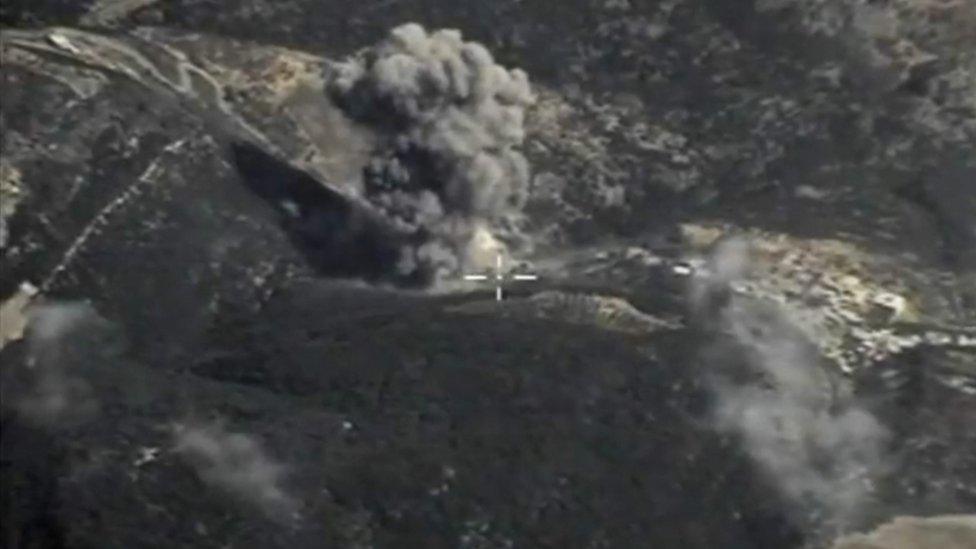Syria conflict: Turkish jets intercept Russian plane
- Published
What hardware does Russia have?
Turkish F-16 fighter jets were scrambled after a Russian warplane violated Turkey's air space on Saturday, the foreign ministry said.
Russia said the incident was a "navigational error" and that it has "clarified" the matter to Ankara.
Turkish jets patrolling the border were also "harassed" by an unidentified plane on Sunday, Turkey said.
Russia has been carrying out air strikes in Syria in support of President Bashar al-Assad.
Turkey, a Nato member, has called the Russian strikes a "grave mistake".
The US Secretary of State John Kerry said: "We're greatly concerned about it because it is precisely the kind of thing that, had Turkey responded under its rights, could have resulted in a shoot-down."
Representatives of Nato's 28 member states will meet later to discuss the incursion into Turkey.
On Monday Russia said, external it had "continued performing pinpoint strikes" on IS targets in Syria, carrying out 25 sorties and hitting nine Islamic State (IS) targets.
Among those targets was a communications centre in Homs, and a command centre in Latakia, it said.

Russian air strikes - in depth
Where key countries stand - Who is backing whom
Why? What? How? - Five things you need to know about Russia's involvement
What can Russia's air force do? - The US-led coalition has failed to destroy IS. Can Russia do any better?
The close ties behind Russia's Syrian intervention - Lina Sinjab on two countries that are the best of friends
Syria's civil war explained - Analysis and background on the conflict

The Russian air campaign began on Wednesday, with Moscow saying it was targeting IS positions and those of other extremists. Syria said on Monday that the air strikes had been planned for months, external.
But Turkey and other members of the US-led coalition in Syria say the principal target is in fact the Syrian opposition groups fighting President Assad.
They assert that Russia's intervention will further escalate the conflict and risks driving more recruits to IS.

Saturday's interception took place near Yayladagi in the southern Hatay region, Turkey says. The foreign ministry in Ankara said it had summoned the Russian ambassador to issue a "strong protest".
Turkish Prime Minister Ahmet Davutoglu told Turkish TV that the rules of engagement were clear, whoever violates its airspace.
"The Turkish Armed Forces are clearly instructed. Even if it is a flying bird, it will be intercepted," he said.
But he played down the possibility of a "Turkey-Russia crisis", saying that channels between the two countries remained open.

Russia released this image showing a hit on what it said was an IS facility in Idlib province
The Turkish foreign minister, Feridun Sinirlioglu, has spoken to his Russian counterpart Sergei Lavrov, as well as ministers from other Nato countries.
The Russian fighter plane "exited Turkish airspace into Syria" after being intercepted, the ministry said, external.
After meeting Mr Sinirlioglu, Nato Secretary General Jens Stoltenberg said the incursion was "unacceptable".
Russia ships 'prepared'
Meanwhile, Vladimir Komoyedov, the head of the Russian government's defence committee, says Russia has not ruled out attacking rebel positions using warships.
The RIA Novosti agency quoted him as saying ships were "prepared", external but that an imminent assault was unlikely as rebels were too far inland.
Interfax reports (in Russian) that two more Russian military ships are on their way to the eastern Mediterranean, external.